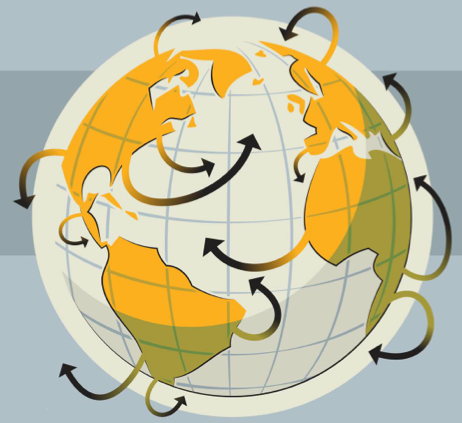
| Date Published | February 24, 2014 |
| Company | Aveda Transportation & Energy Services |
| Article Author | Amy Holland |
| Category | Articles |
We are surrounded by supply chains; every single item in our lives is a link in the supply chain. The food we eat, the computers we use, the clothing we wear, and even the materials used to build our homes have been put there for our use with the help of a supply chain. Supply chains are literally all around us. We touch a piece of a supply chain every day.
Supply chains bring nations and people together to aid with building relationships and economies by providing innovative ideas and ethical business practices. Take a look at what country your belongings have originated from. Now ask yourself who and what were involved in that entire operation to produce this item? For example, the glass table in your house. Where was the sand from, and was it extracted in an ethical transparent matter? Who supplied the sand? Was it a child, or was it supplied from a farmer? If you really think about it, where are the raw materials supplied from? Where is the manufacturer located? Is the manufacture’s facility safe for their employees, and how do the manufacturer’s labor practices operate and affect the final products competitiveness and quality? Are the manufacturers working conditions at an acceptable level for human rights? Are their employees exposed to chemical fumes caused by poor ventilation? Do their employees suffer from malnutrition? Have their employees experienced mass hysteria? The supply chain consistently promotes humanity within goods, because there is more to products than what meets the eye.
The supply chain is within a value chain. A value chain is the life cycle of any operation. Supply chains have been around for centuries and is the planning and implementation of procurement, materials management, vendor management, logistics, and much more. The oldest professions in history are a form of supply chains. To this day, some individuals have not heard of careers in supply chains and have no idea as to what supply chain professionals do or what value they add to the bottom line. Supply chains aim to make everyone happy. They are your cost managers. They can positively affect your EBITDA. They have external customers (the vendors) and internal customers (the company team). They believe in good business practices while remaining ethical, transparent and fair to every stakeholder by making unbiased business decisions based on value evaluations.
Do supply chain professionals really conduct fair business practice?
Do they really give every eligible vendor a fair opportunity to compete for business?
Or do they? Do supply chain professionals really conduct fair business practice? Do they really give every eligible vendor a fair opportunity to compete for business? Or do they personally pick their favourite vendor based solely on a personal relationship or a possible personal gain? Or maybe the perception a personal gain will be achieved? There is a very thin line between personal and business relationships with vendors. The question supply chain professionals need to ask is, do we ever cross this line? Do we ever accept gifts from vendors that may influence our decisions? Do we manipulate a certain bid to ensure a certain vendor wins the business, because we like this vendor on a personal stand point? Or, do we stick to what is right and focus on the stakeholders and ensure he successful vendor wins strictly on a business standpoint? Are economies of scale achieved on that bid? Has the segregation of duties been assigned to protect everyone involved?
Supply chain professionals should be influence to the good ol’ boys to let them know business is no longer like the good ol’ days. Challenge the status quo. The reference to the good ol’ boys is a challenge to the status quo, because back in the good ol’ days there were very few influential women making big decisions in industry. Business is changing, and it is changing for a reason. Higher education today has created a gender-neutral supply chain industry. We are trying to break the old habits of business. A contract is no longer valid based upon a wink, a handshake, and cocktail napkins. Also, the terms and conditions of said contract are no longer based upon “the honor systemâ€. We appreciate feedback from our internal customers, because there is always someone who would like to refer a buddy to bid. Everyone has a friend, or a friend’s wife or a friend’s friend, who owns a company that could use some business from a public trading company. Of course, they are welcome to participate in the tender for future business, and if they win the bid fair and square, that is great! They do not reign precedence over every other vendor bidding, because they are someone’s best buddy, cousin, uncle, or dad. Relationships are extremely important in business. Relationships are gained and maintained after fair business practices and evaluations are exceeded, and once missions and objectives are shared and achieved.
Anybody can get three bids and a buy, which was used back in the dinosaur days. Today supply chain professionals are highly educated, experienced, and believe in practicing strategic business processes.

Amy Holland, Supply Chain Coordinator, Aveda Transportation & Energy Services